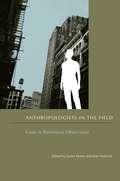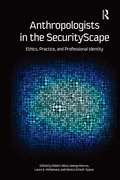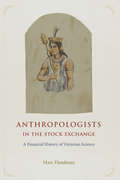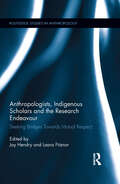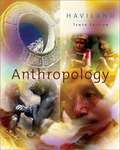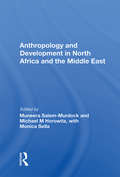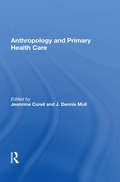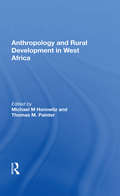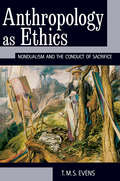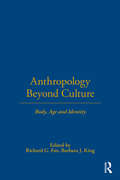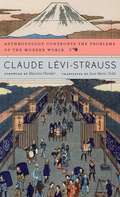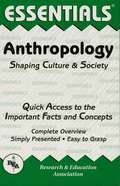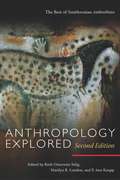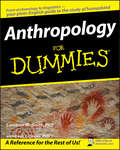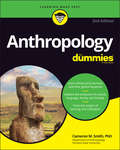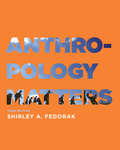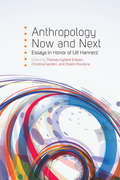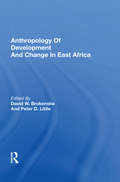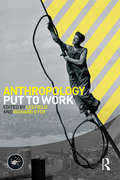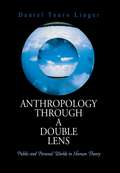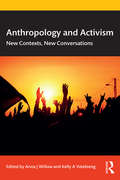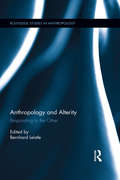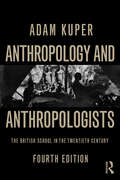- Table View
- List View
Anthropologists and the Rediscovery of America, 1886-1965
by John S. GilkesonThis book examines the intersection of cultural anthropology and American cultural nationalism from 1886, when Franz Boas left Germany for the United States, until 1965, when the National Endowment for the Humanities was established. Five chapters trace the development within academic anthropology of the concepts of culture, social class, national character, value, and civilization, and their dissemination to non-anthropologists. As Americans came to think of culture anthropologically, as a "complex whole" far broader and more inclusive than Matthew Arnold's "the best which has been thought and said," so, too, did they come to see American communities as stratified into social classes distinguished by their subcultures; to attribute the making of the American character to socialization rather than birth; to locate the distinctiveness of American culture in its unconscious canons of choice; and to view American culture and civilization in a global perspective.
Anthropologists in the Field: Cases in Participant Observation
by Hume Lynne Jane Mulcock Eds.All too often anthropologists and other social scientists go into the field with unrealistic expectations. Different cultural milieus are prime ground for misunderstandings, misinterpretations, and interrelational problems. This book is an excellent introduction to real-world ethnography, using familiar and not-so-familiar cultures as cases. <P><P>The book covers participant observation and ethnographic interviewing, both short and long term. These methodologies are open to problems such as lack of communication, depression, hostility, danger, and moral and ethical dilemmas—problems that are usually sanitized for publication and ignored in the curriculum. Among the intriguing topics covered are sexualized and violent environments, secrecy and disclosure, multiple roles and allegiances, insider/outsider issues, and negotiating friendship and objectivity.
Anthropologists in the SecurityScape: Ethics, Practice, and Professional Identity
by Robert Albro George E. Marcus Laura A. McNamara Monica Schoch-SpanaAs the military and intelligence communities re-tool for the 21st century, the long and contentious debate about the role of social scientists in national security environments is dividing the disciplines with renewed passion. Yet, research shows that most scholars have a weak understanding of what today's security institutions actually are and what working in them entails. This book provides an essential new foundation for the debate, with fine-grained accounts of the complex and varied work of cultural, physical, and linguistic anthropologists and archaeologists doing security-related work in governmental and military organizations, the private sector, and NGOs. In candid and provocative dialogues, leading anthropologists interrogate the dilemmas of ethics in practice and professional identity. Anthropologists in the SecurityScape is essential reading for anyone who wishes to understand or influence the relationship between anthropology and security in the twenty-first century.
Anthropologists in the Stock Exchange: A Financial History of Victorian Science
by Marc FlandreauUncovering strange plots by early British anthropologists to use scientific status to manipulate the stock market, Anthropologists in the Stock Exchange tells a provocative story that marries the birth of the social sciences with the exploits of global finance. Marc Flandreau tracks a group of Victorian gentleman-swindlers as they shuffled between the corridors of the London Stock Exchange and the meeting rooms of learned society, showing that anthropological studies were integral to investment and speculation in foreign government debt, and, inversely, that finance played a crucial role in shaping the contours of human knowledge. Flandreau argues that finance and science were at the heart of a new brand of imperialism born during Benjamin Disraeli’s first term as Britain’s prime minister in the 1860s. As anthropologists advocated the study of Miskito Indians or stated their views on a Jamaican rebellion, they were in fact catering to the impulses of the stock exchange—for their own benefit. In this way the very development of the field of anthropology was deeply tied to issues relevant to the financial market—from trust to corruption. Moreover, this book shows how the interplay between anthropology and finance formed the foundational structures of late nineteenth-century British imperialism and helped produce essential technologies of globalization as we know it today.
Anthropologists, Indigenous Scholars and the Research Endeavour: Seeking Bridges Towards Mutual Respect (Routledge Studies in Anthropology)
by Joy Hendry Laara FitznorThis collection offers the fruits of a stimulating workshop that sought to bridge the fraught relationship which sometimes continues between anthropologists and indigenous/native/aboriginal scholars, despite areas of overlapping interest. Participants from around the world share their views and opinions on subjects ranging from ideas for reconciliation, the question of what might constitute a universal "science," indigenous heritage, postcolonial museology, the boundaries of the term "indigeneity," different senses as ways of knowing, and the very issue of writing as a method of dissemination that divides and excludes readers from different backgrounds. This book represents a landmark step in the process of replacing bridges with more equal patterns of intercultural cooperation and communication.
Anthropology
by Stanley BarrettStanley R. Barrett's Anthropology has long been a premiere sourcebook for students, providing a comprehensive overview of both theory and method in the discipline. In this updated second edition, Barrett's discussion of the origins and evolution of anthropology remains, augmented by sections addressing recent changes and ongoing questions in the field.The second edition of Anthropology adds important new material on questions of culture versus power, Max Weber's thought, the potential of applied anthropology, and the rise of public anthropology, while briefly touching on the anthropology of globalization. As in the previous edition, Barrett remains committed to exploring the impact of postmodernism on the practice and theory of anthropology, positing that it is a formless and ultimately short-lived approach. Including case studies to demonstrate real-world applications of the theories discussed, Barrett's Anthropology remains an essential text for students and teachers of anthropology.
Anthropology
by William A. HavilandThe purpose is to transmit and register ideas and information, to induce the readers to see old things in new ways, and then to ask readers to think about what they see.
Anthropology And Development In North Africa And The Middle East
by Muneera Salem-Murdock Michael M Horowitz Monica SellaThis book documents the function of social science analyses in the identification and evaluation of development programs in the Middle Eastern and North African countries. It demonstrates that anthropology and social sciences have a good deal to contribute to the understanding of domestic economies.
Anthropology And Primary Health Care
by Jeannine Coreil J. Dennis MullThis book covers the major theoretical perspectives, content areas, and methodologic approaches that presently characterize the field of anthropology and primary health care. It is of great value to physicians, epidemiologists, program managers, and other international health professionals.
Anthropology And Rural Development In West Africa
by Michael M HorowitzAnthropology and Rural Development in West Africa documents the experiences of anthropologists with development in West Africa during the past ten years. It presents case study material to bring out the actual and potential contributions of social science to solving development problems found in Africa and in other parts of the Third World. The book is not a manual that seeks to present solutions; rather it describes some of the kinds of development situations in which anthropologists participated and examines the kind of tensions under which they operated.
Anthropology As Ethics: Nondualism and the Conduct of Sacrifice
by T. M. S. Terry EvensAnthropology as Ethics is concerned with rethinking anthropology by rethinking the nature of reality. It develops the ontological implications of a defining thesis of the Manchester School: that all social orders exhibit basically conflicting underlying principles. Drawing especially on Continental social thought, including Wittgenstein, Merleau-Ponty, Levinas, Dumont, Bourdieu and others, and on pre-modern sources such as the Hebrew bible, the Nuer, the Dinka, and the Azande, the book mounts a radical study of the ontology of self and other in relation to dualism and nondualism. It demonstrates how the self-other dichotomy disguises fundamental ambiguity or nondualism, thus obscuring the essentially ethical, dilemmatic, and sacrificial nature of all social life. It also proposes a reason other than dualist, nihilist, and instrumental, one in which logic is seen as both inimical to and continuous with value. Without embracing absolutism, the book makes ambiguity and paradox the foundation of an ethical response to the pervasive anti-foundationalism of much postmodern thought.
Anthropology Beyond Culture (Wenner-Gren International Symposium Series)
by Barbara J. King Richard G. FoxCulture is a vexed concept within anthropology. From their earliest studies, anthropologists have often noted the emotional attachment of people to their customs, even in cases where this loyalty can make for problems. Do anthropologists now suffer the same kind of disability with respect to their continuing emotional attachment to the concept of culture? This book considers the state of the culture concept in anthropology and finds fault with a ‘love it or leave it' attitude. Rather than pledging undying allegiance or summarily dismissing it, the volume argues that anthropology can continue with or without a concept of culture, depending on the research questions being asked, and, furthermore, that when culture is retained, no single definition of it is practical or necessary. Offering sensible solutions to a topic of hot debate, this book will be essential reading for anyone seeking to learn what a concept of culture can offer anthropology, and what anthropology can offer the concept of culture.
Anthropology Confronts the Problems of the Modern World
by Claude Levi-StraussAnthropology Confronts the Problems of the Modern World is the first English translation of a series of lectures Claude Lévi-Strauss delivered in Tokyo in 1986. Written with an eye toward the future as his own distinguished career was drawing to a close, this volume presents a synthesis of the author’s major ideas about structural anthropology, a field he helped establish. Critiquing insights of his earlier writings on the relationship between race, history, and civilization, Lévi-Strauss revisits the social issues that never ceased to fascinate him. He begins with the observation that the cultural supremacy enjoyed by the West for over two centuries is at an end. Global wars and genocides in the twentieth century have fatally undermined Western faith in humanity’s improvement through scientific progress. Anthropology, however, can be the vehicle of a new “democratic humanism,” broadening traditional frameworks that have restricted cross-cultural understandings of the human condition, and providing a basis for inquiries into what other civilizations, such as those of Asia, can teach. Surveying a world on the brink of the twenty-first century, Lévi-Strauss assesses some of the dilemmas of cultural and moral relativism a globalized society faces-ethical dimensions of economic inequality, the rise of different forms of religious fundamentalism, the promise and peril of genetic and reproductive engineering. A laboratory of thought opening onto the future, Anthropology Confronts the Problems of the Modern World is an important addition to the canon of one of the twentieth-century’s most influential theorists.
Anthropology Essentials (REA's Essentials Series)
by Michael AngrosinoREA's Essentials provide quick and easy access to critical information in a variety of different fields, ranging from the most basic to the most advanced. As its name implies, these concise, comprehensive study guides summarize the essentials of the field covered. Essentials are helpful when preparing for exams, doing homework and will remain a lasting reference source for students, teachers, and professionals. Anthropology discusses human evolution and development, human adaptation to the environment, culture, society, the individual, social organization, social stratification and transaction, symbolic expressions, and anthropology and the future.
Anthropology Explored, Second Edition: The Best of Smithsonian AnthroNotes
by P. Ann Kaupp Marilyn R. London Ruth SeligThis new edition offers a variety of clearly written and readily accessible articles from the Smithsonian's highly acclaimed, award-winning publication AnthroNotes. Some of the world's leading anthropologists explore fundamental questions humans ask about themselves as individuals, as societies, and as a species. The articles reveal the richness and breadth of anthropology, covering not only the fundamental subjects but also the changing perspectives of anthropologists over the 150-year history of their field. Illustrated with original cartoons by anthropoligst Robert L. Humphrey, Anthropology Explored opens up to lay readers, teachers, and students a discipline as varied and fascinating as the cultures it observes.
Anthropology For Dummies
by Cameron M. Smith Evan T. DaviesCovers the latest competing theories in the fieldGet a handle on the fundamentals of biological and cultural anthropologyWhen did the first civilizations arise? How many human languages exist? The answers are found in anthropology - and this friendly guide explains its concepts in clear detail. You'll see how anthropology developed as a science, what it tells us about our ancestors, and how it can help with some of the hot-button issues our world is facing today.Discover:How anthropologists learn about the pastHumanity's earliest activities, from migration to civilizationWhy our language differs from other animal communicationHow to find a career in anthropology
Anthropology For Dummies
by Cameron M. SmithStudy the science of all of us Anthropology is the organized study of what makes humans human. It takes an objective step back to view homo sapiens as a species and ask questions like: Given our common characteristics, why aren’t all of us exactly the same? Why do people across the world have variable skin and hair color and so many inventive ways to say hello? And how can knowing the reasons behind our differences—as well as our similarities—teach us useful lessons for the future? The updated edition of Anthropology For Dummies gives you a panoramic view of the fascinating fieldwork and theory that seeks to answer these questions—and helps you view the human world through impartial, anthropological eyes. Keeping the jargon to a minimum, Anthropology For Dummies explores the four main subdivisions of the discipline, from the adventurous Indiana Jones territory of archaeology and the hands-on biological insights provided by our physical nature to the studious book-cracking brainwork of cultural and linguistic investigation. Along the way, you’ll journey deep into our prehistory where we begin to differentiate ourselves from our primate relatives—and then fast forward into the possibilities of centuries yet to come. Explore the history of anthropology and apply its methods Get a deep, scientific take on contemporary debates such as identity Excavate the human past through new fossil discoveries Peer into humanity’s future in space Whether you’re studying anthropology for school or just want to know more about what makes us humans who we are, this is the perfect introduction to humanity’s past and present—and a clue to what we need to build a better future.
Anthropology Matters, Third Edition
by Shirley A. FedorakThe third edition of this bestselling book introduces readers to anthropology, and the world around it, by connecting important concepts to current global issues. A question-based approach encourages readers to understand specific issues in a broader cross-cultural context while building an appreciation for anthropology’s role in developing global citizenship. This edition has been updated and revised throughout, including discussion of technology, design anthropology, and the effects of social media on cultural change. As well, two new chapters, one on global responsibility for refugees, and the other on human trafficking as a form of modern-day slavery, make the text particularly relevant.
Anthropology Now and Next: Essays in Honor of Ulf Hannerz
by Thomas Hylland Eriksen, Christina Garsten, and Shalini RanderiaThe scholarship of Ulf Hannerz is characterized by its extraordinary breadth and visionary nature. He has contributed to the understanding of urban life and transnational networks, and the role of media, paradoxes of identity and new forms of community, suggesting to see culture in terms of flows rather than as bounded entities. Contributions honor Hannerz’ legacy by addressing theoretical, epistemological, ethical and methodological challenges facing anthropological inquiry on topics from cultural diversity policies in Europe to transnational networks in Yemen, and from pottery and literature to multinational corporations.
Anthropology Of Development And Change In East Africa
by Peter D. Little David W. BrokenshaThe editors are grateful for the editing and production assistance of a number of IDA staff members, especially Sylvia Horowitz, who copyedited the entire manuscript and supervised its transformation for computer-generated typesetting. Vivian Carlip gave a second editorial reading, Cecily O'Neil helped with production, the manuscript was proofread by Vera Beers-Tyler, and Peter Daly designed the map on the following page. To the contributors, of course, goes our greatest appreciation, for their gracious cooperation in making requested revisions as well as for the content of their work.
Anthropology Put to Work (Wenner-Gren International Symposium Series)
by Richard G. Fox Les W. FieldHow do anthropologists work today and how will they work in future? While some anthropologists have recently called for a new "public" or "engaged" anthropology, profound changes have already occurred, leading to new kinds of work for a large number of anthropologists. The image of anthropologists "reaching out" from protected academic positions to a vaguely defined "public" is out of touch with the working conditions of these anthropologists, especially those junior and untenured. The papers in this volume show that anthropology is put to work in diverse ways today. They indicate that the new conditions of anthropological work require significant departures from canonical principles of cultural anthropology, such as replacing ethnographic rapport with multiple forms of collaboration. This volume's goal is to help graduate students and early-career scholars accept these changes without feeling something essential to anthropology has been lost. There really is no other choice for most young anthropologists.
Anthropology Through a Double Lens
by Daniel Touro LingerHow can we hold both public and personal worlds in the eye of a unified theory of meaning? What ethnographic and theoretical possibilities do we create in the balance? Anthropology Through a Double Lens offers a theoretical framework encompassing both of these domains--a "double lens." Daniel Touro Linger argues that the literary turn in anthropology, which treats culture as text, has been a wrong turn. Cultural analysis of the interpretive or discursive variety, which focuses on public symbols, has difficulty seeing--much less dealing convincingly with--actual persons. While emphasizing the importance of social environments, Linger insists on equal sensitivity to the experiential immediacies of human lives. He develops a sustained critique of interpretive and discursive trends in contemporary anthropology, which have too strongly emphasized social determinism and public symbols while too readily dismissing psychological and biographical realities.Anthropology Through a Double Lens demonstrates the power of an alternative dual perspective through a blend of critical essays and ethnographic studies drawn from the author's field research in São Luís, a northeastern Brazilian state capital, and Toyota City, a Japanese factory town. To span the gap between the public and the personal, Linger provides a set of analytical tools that include the ideas of an arena of meaning, systems of systems, bridging theory, singular lives, and reflective consciousness. The tools open theoretical and ethnographic horizons for exploring the process of meaning-making, the force of symbolism and rhetoric, the politics of representation, and the propagation and formation of identities. Linger uses these tools to focus on key issues in current theoretical and philosophical debates across a host of disciplines, including anthropology, psychology, history, and the other human sciences..
Anthropology and Activism: New Contexts, New Conversations
by Anna J. WillowThis book offers a comprehensive and current look at the complex relationship between anthropology and activism. Activism has become a vibrant research topic within anthropology. Many scholars now embrace their own roles as engaged social actors, which has compelled reflexive attention to the anthropology/activism intersection and its implications. With contributions by emerging scholars as well as leading activist anthropologists, this volume illuminates the diverse ways in which the anthropology/activism relationship is being navigated. Chapters touch on key areas including environment and extraction, food sustainability and security, migration and human rights, health disparities and healthcare access, class and gender identities and empowerment, and the defense of democracy. Case studies (drawn mainly from North America) encourage readers to think through their own experiences and expectations and will serve as durable documentation of how movements develop and change. This timely survey of the activist anthropological landscape is valuable reading in an era of widely perceived ecological and political crisis, where disinterested data collection increasingly appears to be a luxury that neither the discipline nor the world can afford.
Anthropology and Alterity: Responding to the Other (Routledge Studies in Anthropology)
by Bernhard LeistleAlterity or otherness is a central notion in cultural anthropology and philosophy, as well as in other disciplines. While anthropology, with its aim of understanding cultural difference, tends to take otherness as a fact, there have been vigorous attempts in contemporary philosophy, particularly in phenomenology, to answer the fundamental question: What is the Other? This book brings the two approaches to otherness – the hermeneutical pragmatics of anthropology, and the radical reflection of philosophy – together, with the goal of enriching one through the other. The philosophy of the German phenomenologist Bernhard Waldenfels, up to now little known to anthropologists, has a central position in this undertaking. Waldenfels’s concept of a responsivity to the Other offers to cultural anthropology the possibility of a philosophical engagement with the Other that does not contradict the project of making sense of concrete empirical others. The book illustrates the fertility of this new approach to alterity through a broad spectrum of themes, ranging from reflections on theory formation, via discussions of race and human-animal relations, to personal meditations on experiences of alterity.
Anthropology and Anthropologists: The British School in the Twentieth Century
by Adam KuperAnthropology and Anthropologists provides an entertaining and provocative account of British social anthropology from the foundations of the discipline, through the glory years of the mid-twentieth century and on to the transformation in recent decades. The book shocked the anthropological establishment on first publication in 1973 but soon established itself as one of the introductions for students of anthropology. Forty years later, this now classic work has been radically revised. Adam Kuper situates the leading actors in their historical and institutional context, probes their rivalries, revisits their debates, and reviews their key ethnographies. Drawing on recent scholarship he shows how the discipline was shaped by the colonial setting and by developments in the social sciences.

